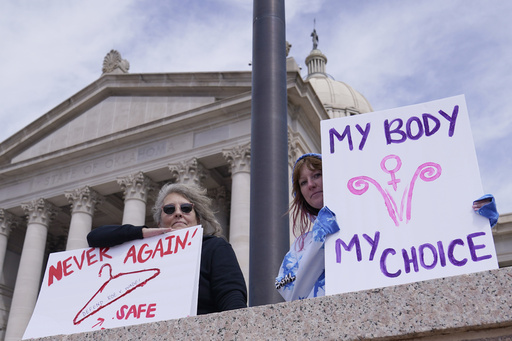
Abortion rights supporters expressed concerns that the 2022 U.S. Supreme Court decision, which allowed states to impose their own bans on abortion, might lead to women being monitored and potentially charged with murder for seeking abortions. Although no states have enacted laws permitting this, such discussions have resurfaced in various state legislatures recently.
In Oklahoma, a proposed bill to permit murder charges was rejected following public hearings, while similar legislation was dismissed in North Dakota after extensive debate. Even though proposals like these have been presented previously, they often failed to receive hearings, primarily due to opposition from significant anti-abortion organizations.
In Missouri, a legislative committee reviewed a bill that proposed establishing a database of pregnant women deemed “at risk” of considering abortions, with the intention of connecting them with potential adoptive parents.
This Missouri bill would task the state’s Department of Social Services with creating a new division specifically responsible for maintaining a central registry of expectant mothers considered at risk of terminating their pregnancies. Additionally, this division would compile a list of prospective adoptive parents and facilitate adoption processes. House Speaker Jonathan Patterson, a Republican, indicated that while he supports the goal of promoting adoption, he believes the bill lacks widespread backing among fellow Republican lawmakers. Two similar bills were withdrawn this week, raising concerns about privacy issues related to the proposed registry. Patterson emphasized the need for rigorous safeguards to protect individuals’ private information, a sentiment shared by many Republicans who are also apprehensive about an expansion of government and wary of the estimated $30 million annual financial burden.
Despite these reservations, the bill has garnered some endorsements. Susan Klein, the executive director of Missouri Right to Life, publicly supported the bill, stating that it refutes claims made by pro-abortion activists who allege that the pro-life movement disregards the welfare of women and children post-birth.
Concerns regarding the tracking of pregnant women are not a new phenomenon. The Planned Parenthood Federation of America pointed out that the Missouri bill is unprecedented, yet fears about the potential scrutiny of pregnant individuals’ health information have existed for some time. Advocates for abortion rights warn that if reproductive health data lacks sufficient privacy safeguards, it could be exploited for targeted marketing or legal investigations. Recent efforts by several Democratic-led states have sought to fortify protections around such health data.
In a recent media call, Katie Knutter, executive director of Wellspring Health Access, a Wyoming-based abortion provider, shared that she frequently hears from patients traveling from other states who express fears of being monitored when seeking abortions, despite the absence of specific laws to that effect. “The heightened media narratives have made patients acutely aware and increasingly anxious about these risks,” Knutter noted.
Meanwhile, efforts to introduce legal consequences against women obtaining abortions have been largely unsuccessful. Just days ago, Oklahoma’s Senate Judiciary Committee decided against advancing a proposal that would have allowed murder charges against women who obtain abortions, a move that could have carried severe penalties, including life imprisonment or the death penalty. A similar proposal in North Dakota was defeated by a significant margin.
Organizations such as the National Right to Life Committee and Susan B. Anthony Pro-Life America have consistently encouraged lawmakers to avoid such extreme measures, advocating that many women face coercive circumstances surrounding their abortion decisions and should not face criminal repercussions.
Conversely, some conservative lawmakers argue the importance of closing perceived loopholes in abortion legislation. Senator Dusty Deevers, the sponsor of the Oklahoma proposal, expressed concern over the increasing availability of abortion pills prescribed out of state through telehealth services. A recent survey conducted for the Society of Family Planning documented close to 1,000 telemedicine abortions in Oklahoma during the latter half of 2023. Research from the Guttmacher Institute indicates that, by the year 2023, over 60% of abortions in the formal healthcare system in the U.S. involved medication.
However, both Democratic and some Republican committee members have raised alarms over the potential implications of the law. They worry that it might lead to criminal investigations of women experiencing miscarriages or provoke support for constitutional amendments favoring abortion rights within the state, in addition to raising concerns about enforcement challenges. Similar propositions in Idaho and Indiana seem unlikely to progress, yet new legislative attempts have also emerged in states such as South Carolina and Texas.

